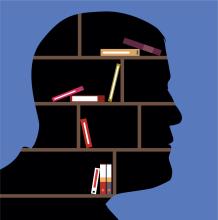racial justice
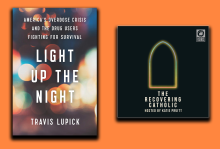
Rediscovering God
Katie Pruitt’s debut album, Expectations, explored growing up gay and Catholic in the American South. On her new podcast series, The Recovering Catholic, she speaks with comedians, religious leaders, and other artists about how they see God and what spirituality means today. Osiris Media.
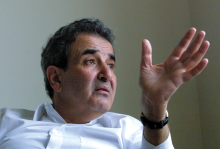
HISTORY HAS PAID personal attention to Lawrence Joseph, a Maronite Catholic from Detroit. In 1967, when Joseph was 19 and just finished with his freshman year at the University of Michigan, his father’s grocery-liquor store was looted and burned during the Detroit Rebellion. The five-day uprising of Black people reacting in part to police abuse and brutality and its fierce suppression by law enforcement and the National Guard made him “acutely conscious of America’s deeply systemic violence.”
Joseph, a poet who was also a lawyer who taught at St. John’s University in Queens, N.Y., and at Princeton, was living a block from the World Trade Center in 2001 when the two planes attacked. He and his wife had to evacuate their apartment. It was weeks before they could return. In the title poem of his 2017 volume So Where Are We?, Joseph writes:
flailing bodies in midair—
the neighborhood under thick gray powder—
on every screen. I don’t know
where you are, I don’t know what
I’m going to do, I heard a man say;
the man who had spoken was myself.
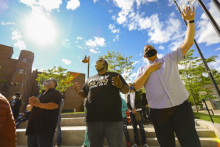
In practicing surrender daily, I began experiencing God in a way that infused a stronger sense of justice, mercy, and compassion without feeling overwhelmed by the work. By going inward, I was able to reach further outward. How is that possible? ReWire helped me make contemplation a daily practice.
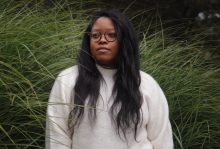
FOR THE MILLENNIAL founder of a viral social media account, Cole Arthur Riley is surprisingly unplugged. “This is a fun fact that most people probably wouldn’t guess,” she told Sojourners in June, “but I actually don’t have a smartphone.”
Riley is the creator and curator of @BlackLiturgies, an Instagram profile and social media “space where Black spiritual words live in dignity, lament, rage, and liberation to the glory of God.” It is where, until this fall, she posted almost daily the liturgies she writes: Liturgies for Ma’Khia Bryant, Breonna Taylor, Ahmaud Arbery, George Floyd. Prayers of remembrance for the Tulsa Race Massacre. Invocations for those living with chronic illness and those struggling with anxiety. @BlackLiturgies goes beyond the usual liturgical calendar of Advent, Christmas, Lent, Holy Week, and Easter, embedding that rotation within a larger grammar of spiritual expression for Black survival and thriving.
Riley’s liturgies look and circulate like memes, but trade humor for a holiness rooted in the embodied knowledge and sacred truth of Black life. The bricolage of written prayer, quotations, scriptures, poetry, and statements in white text on brown, green, and blue backgrounds gained thousands of likes and reposts within hours. If you are on social media, the images are likely familiar, but the person behind them, and her story, less so.
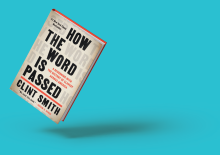
THE STATUE OF Liberty, author Clint Smith tells us, was supposed to celebrate the abolition of slavery. Early models depicted the iconic copper lady holding a raised torch in one hand and a pair of broken shackles in the other, but the final version included only a piece of broken chain at the lady’s feet. With slavery shifted to the periphery, Ellis Island’s visitors could imagine liberty was, and is, possible without abolition.
In How the Word Is Passed, Smith visits multiple historic sites to offer a mosaic portrait of how different places tell, or do not tell, the truth about slavery. The book meditates on the capacity of our collective symbolic infrastructure to prepare us to rectify persistent material inequalities. If we frame slavery as something that “happened a long time ago” or leave unchallenged the warping of the Confederate commitment to enslavement into myths of honor and heritage—if, in a word, we misremember the wound—then we will not summon the will nor the proper know-how to heal it.

GROWING UP, I read tons of historical fiction and often imagined the lives and times of my ancestors. My curiosity stemmed, in no small part, from my family, who dragged us to every available Black history and Black art museum. Whether visiting California’s first and only Black town, where my great-great-grandparents had bought land; making a pilgrimage to the National Underground Railroad Freedom Center during a family reunion; taking Black history bus tours; or hearing family stories from my grandmother and great-aunt, Black history was never far from our everyday lives.
Recently, technological developments and my growing archival research skills have enabled me to dig further into our family history. As DNA ancestry testing and digitized documents have become more widespread, I have been able to find graves and documents that could have been lost to history. The past, for me, has become even more close at hand as a crucial way of understanding the present.
Relating to the past in this way—an approach that resonates with Black families across the diaspora—stands in stark contrast to ongoing efforts to erase, distort, and lie about history.
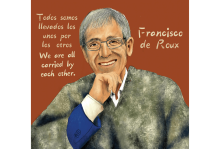
AS WE WORKED on the three feature articles in this issue, a common theme became clear: Each of the authors, in distinctive ways and from varied points of view, was grappling with related questions: How do we take the next steps in constructing a more just church and society? What models can help guide us as we go about the work of building something new?
In an excerpt from his new book A More Perfect Union, Sojourners President Adam Russell Taylor looks to the southern African philosophy of ubuntu—interdependence—as offering wisdom that goes far beyond one-on-one relationships to a paragon for society itself. Colleen Murphy, a law professor in Illinois and an expert in issues of transitional justice, explains why making progress on racial justice requires facing the hard realities of our past. And associate editor Christina Colón talked with pastors about how their churches will be different as they enter the post-quarantine era. In their own unique ways, each author is wrestling—as all of us are called to do—with questions of what it means to put our faith into action in an uncertain world.
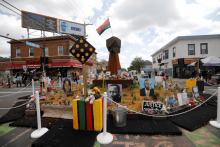
“This solidarity has the potential and the power to propel us into a new future as a community,” Rev. Ingrid Rasmussen, pastor at Holy Trinity Lutheran Church in Minneapolis, told Sojourners.

Rather than reflecting the truth of the motivations of both workers and employers, the "labor shortage" conversation is a tactic to adjust public perception and create the political will big corporations need to capture cheap labor –– it's propaganda at its most straightforward.
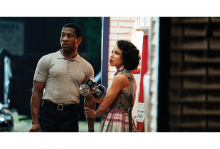
EVERYTHING THAT THE devil stole, HBO’s giving back to me. That’s a sacrilegious statement, but sometimes that’s how I feel when I’m on my couch watching yet another show with a largely Black cast (and sometimes even crew) miraculously greenlit in a sea of Hollywood whiteness by the network titan that years ago gave us The Wire and made many of us notice the likes of Idris Elba.
For what seemed like eons to Black folks eager for visual confirmation that their lives mattered, Black characters on TV were mostly relegated to sidekick or background roles—and Black writers, directors, and showrunners were rare or entirely absent. But from Insecure to A Black Lady Sketch Show, Watchmen to I May Destroy You, HBO is perhaps the strongest ally for revolutionary Black artists and creators of color on and behind TV.

In Paul’s letter to the church at Rome, he writes, “And we know that in all things God works for the good of those who love him” (Romans 8:28). This passage can easily be misconstrued to mean that adversity and hardship are ordained by God. A more faithful interpretation is that God can generate good out of even terrible circumstances. In light of this eternal truth, throughout this troubling year I have found hope and resilience by discovering silver linings in the midst of uncertainty and anguish.
One of the most important blessings has been extra, uninterrupted time with my family. A frenetic travel schedule in the spring came to a screeching halt in March, and I haven’t been on a plane since. My daily two-hour commute to my kids’ school and to work also vanished. I have tried to pour much of this precious gift into my family, particularly as my two young sons adjusted to the new COVID reality, including virtual classes that tested all our sanity. Our family spent the early months of the pandemic playing many games together and watching every Marvel movie made and our favorite kid-appropriate sports movies, from Remember the Titans to Miracle to 42.
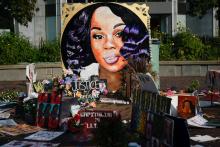
Breonna Taylor’s name didn’t even appear in Wednesday’s indictment against Hankison, which raises alarming questions about what case the attorney general made to defend the value of her life. The decision exposes the value gap in our justice system that so often dismisses and degrades the value of Black life and treats police recklessness and misconduct with impunity. Kentucky Attorney General Daniel Cameron failed to explain why Hankison felt it was necessary to shoot wildly and blindly into the apartment from the parking lot or the details around how this seemingly faulty no-knock warrant was obtained and executed in the first place.

We live in the shadow of flags meant to forever hide us, to remind us we don’t belong.

What remains for all who’ve hit rock bottom is the long road to healing.

HERE WE LEARN from the ghost of Marvin Gaye, question the ethics of Nikola Tesla, examine the character of God, and drift in lament and wonder.
In these poems by Hanif Abdurraqib, violence appears in different forms. In some lines, it is a fistfight between teenagers in a schoolyard, in others the anti-Blackness of a suburb or the music industry: “[T]he mailman still hands me bills like I should feel lucky to have my name on anything in this town,” Abdurraqib writes.
Thirteen of the 51 poems are titled after a criticism he heard from a white woman at a poetry reading in 2016: “How can black people write about flowers at a time like this?”

Before I learned my town’s true history, I cared about racial justice.
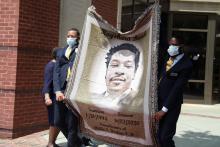
Whether their blood cries out from Valdosta Ga., or the Georgia Diagnostic and Classification Prison, their cries cannot go unanswered.

On the 155th observance of Juneteenth, a collective of Black church pastors and theologians released a theological statement to “emphatically repudiate the evil beast of white racism, white supremacy, white superiority and its concomitant and abiding anti-Black violence.”

This history runs through, into, and over my interracial children.
